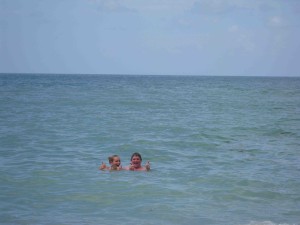| Now, the senior state epidemiologist with the Oregon Health Division, is asking, were mountain goats the source of a cryptosporidium outbreak in Baker City, Oregon, that sickened at least 14 people and potentially hundreds?
The Baker City Herald reports that most of the confirmed crypto cases in the U.S. over the past 20 years — there were 7,656 confirmed or probable cases in 2009, and 8,951 in 2010 — were linked to sources such as swimming pools and daycare centers,  not municipal drinking water, according to the federal Centers for Disease Control and Prevention. For example, an outbreak of crypto that sickened at least 18 in Hull, UK, earlier this month was linked to a childrens’ splash pool. not municipal drinking water, according to the federal Centers for Disease Control and Prevention. For example, an outbreak of crypto that sickened at least 18 in Hull, UK, earlier this month was linked to a childrens’ splash pool.
If another theory about the Baker City outbreak pans out — that the crypto source was feces from mountain goats that live near Goodrich Reservoir — that would be the first such case in crypto annals, at least in the U.S., Keene said.
“I’m pretty sure mountain goats have never been tested (for crypto),” Keene said.
(Cougars or feral cat poop that entered drinking water are believed to have been the source of a toxoplasmosis outbreak in Victoria, B.C. in 1995 that sickened at least 110 and upwards of 3,000.)
Keene said crypto “has been around forever,” and that small numbers of oocysts likely are present in most surface water.
But given the rarity of outbreaks caused by municipal water supplies — including ones, like Baker City’s, that use unfiltered surface water — it seems that Baker City’s ordeal could be “the exception proving the rule,” he said.
Although federal statistics show a sharp increase in crypto cases starting in the 1980s, Keene said that trend likely reflects more widespread testing rather than an actual spread in crypto.
Until the 1980s crypto tests were rare, and they required a high level of expertise.
What brought the bug into the mainstream, so to speak, was the AIDS epidemic of the 1980s. Because AIDS patients have severely compromised immune systems they are especially vulnerable to crypto.
“People were dying from this,” Keene said.
Today, crypto tests are easier and more effective, and doctors and other officials are much more likely to suspect crypto than they used to be, he said.
Speaking of tests, Keene said the “official” count of 14 crypto cases in Baker City certainly doesn’t reflect the total number of infections.
That’s almost always the case in outbreaks, he said, because with otherwise healthy people the infection usually doesn’t cause symptoms that require medical attention, so relatively few people ever have stool samples tested.
Keene, who was in Baker City for several days before returning to his Portland office on Monday afternoon, said he and colleagues visited 21 Baker City homes and talked with 62 residents.
Of those, 18 had had symptoms consistent with crypto, Keene said — 29 percent of the total.
Keene said he wouldn’t conclude from that small sample size that one-third of residents were infected — that would be almost 3,000 people — but he said the total cases “could easily be in the hundreds.” |
 All three patients attended the park during the fourth week of July.
All three patients attended the park during the fourth week of July.








